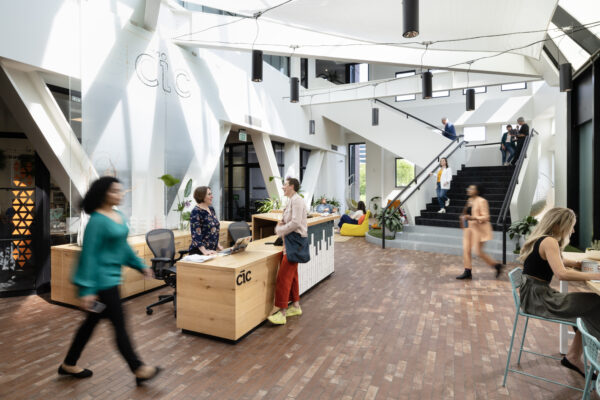As 86% of those involved in their organization’s workspace decisions agree that having the option to come into a physical office is beneficial for employees, this study highlights paradigm shifts as physical workspace, company culture, and business outcomes become more intertwined
CIC, a global leader in building and operating innovation ecosystems, unveiled findings from a new report titled, “Redefining The Workspace To Strategically Support Corporate Culture, Innovation, and Growth”, by Harvard Business Review Analytic Services. The study surveyed more than 560 members of the HBR audience who are involved in their organization’s workspace decisions on the strategic business role of the workspace. It revealed that today’s organizations are beginning to understand that workspace decisions are not just about square footage and layouts; they are critical determinants of a company’s success.
While the nature of work post-pandemic has forced business leaders to rethink their physical workspace, company culture, and business outcomes, the survey discovered, among other findings, that 86% of respondents agree that having the option to come into a physical office is beneficial for employees. As such, the study also revealed that a number of organizations are adjusting their current workplaces, in many cases motivated by a desire to improve their company culture. When it comes to the types of workspaces organizations use, of the list presented the most common changes that respondents say their organizations have made in the past three years, or are currently making, include:
- Adding more satellite locations outside of HQs (22%)
- Leasing an entire office/floor in an externally managed flexible workspace or coworking space (18%)
- Shifting from long-term (owned space or long-term lease) to more short-term options (16%)
- Renting out our own office space to other businesses (16%)
“Over the past few years it has become clear that the dynamics of a workspace wield a profound impact on every facet of an organization,” said Tim Rowe, Founder and CEO of CIC. “These new findings underscore that companies are increasingly realizing the bottom line benefits that flexible office and lab space provide, and they’re evolving to prioritize not just cost, but the critical value of community and culture.”
The new workspace report also examined how companies are balancing flexibility with other important considerations around talent and culture, innovation, performance and profitability. Some key highlights include:
Workspace decisions are critical to culture, and culture is critical to business success
As the landscape of workspace decisions has evolved, organizations are recognizing that this realm is a defining factor in success. The vast majority of respondents (88%) agree that organizations should consider workspace decisions a strategic priority. And it’s been shown that getting these strategies right can pay dividends. One of the biggest areas to consider is company culture. Virtually all respondents (97%) agree that workspace decisions impact the company culture of an organization, and 98% agree that the quality of an organization’s company culture impacts its ability to succeed.
Businesses are adapting for flexibility, connection and collaboration
In today’s landscape, it’s imperative that companies thoughtfully make workplace decisions that are deliberate and serve a purpose. As such, companies are prioritizing connection and collaboration, applying facility enhancements like:
- Adding enhanced digital conferencing facilities to connect remote and in-office workers (76%)
- Adding more unassigned desks or offices (e.g. “hot desking”) (62%)
- Adding more meeting spaces/collaborative workspaces (59%)
What companies are really looking for is flexibility — offering employees everything they need to be productive and innovative, while also adapting to a new paradigm of work. Culture is a key part of operational flexibility, so with greater workspace flexibility it, in turn, drives a better business impact. When asked about the primary motivating factors to reassess their workplace, around one-third said to improve company culture/engagement (42%), to encourage employees to meet/work in person (34%), and to be a more attractive employer (24%).
The power of community, connection and proximity is front and center as business leaders also increasingly prioritize opportunities to network or engage in meaningful in-person interactions. Around half (53%) say their organization has added, or is currently adding, more mentoring and professional growth opportunities, and a similar amount (52%) say they’ve added, or are currently adding, more team bonding outings. Additionally, 77% of respondents agree their organization is interested in having employees attend in-person events to connect with a wider business community.
“In the wake of the pandemic, the need for flexibility from an employee perspective is paramount. The definition of the office has fundamentally changed, and decision-makers are juggling everything from costs to functionality. Every decision is critical to business success,” said Alex Clemente, Managing Director, Harvard Business Review Analytic Services. “Traditionally, the corporate real estate function was associated with facilities management; today, organizations are approaching the workspace as a strategic priority that affects their operating model, talent acquisition and retention, culture, and business outcomes.”
Read the full CIC report, prepared for Harvard Business Review Analytic Services, here.
About CIC
CIC builds and operates a global network of innovation campuses where startups, scale-ups, corporations and public entities connect, work, and grow. Founded in 1999, CIC manages more than 1.2 million square feet of innovation-focused workspace, laboratories, and event space across North America, Europe and Asia. Additionally, CIC develops bespoke programming, builds and enables industry clusters, and provides world-class district consulting—all focused on advancing innovation.
Learn more about CIC’s innovation campuses featuring workspace & labs, programming, and events at CIC.com. Follow along on LinkedIn, Instagram, and Facebook.




